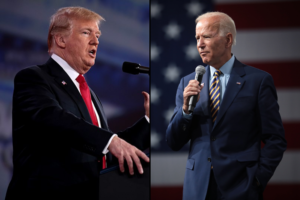
The 2024 elections are around the corner and many candidates are vying for attention. With such a large pool of presidential candidates, it may be tempting to hope the 2024 general election will consist of new nominees. However, the next general election will most likely be a rematch between President Joe Biden and former President Donald Trump, despite the fact that both of them have an overall negative favorability according to numerous polls.
On the right side of the aisle, there were a total of nine Republicans who polled well enough and received enough individual donations to qualify for the first Republican debate. This includes Florida Governor Ron Desantis who is coming off of a successful reelection campaign where he defeated his Democratic opponent by 19 percentage points in a state that was seen as a swing state won by both George W. Bush and Barack Obama. In the 2016 and 2020 elections, Donald Trump won the state by fewer than four percentage points. There were hopes for DeSantis’ supporters that he could use the momentum of his historic victory in Florida to propel himself into frontrunner status for the Republican nomination for president. But so far, that belief has not materialized. The other candidates in the race who qualified for that first debate have extremely minimal support and are unlikely to gain any ground during their campaigns.
Trump’s former Vice-President, Mike Pence, is also on the campaign trail. His campaign has a very slim chance of finding any success. This is in large part because of the responsibility he took in upholding the peaceful transfer of power on Jan. 6, 2021. On that day, Mike Pence used his power as the Vice-President to certify the election results that delivered Joe Biden the presidency. After Mike Pence protected America’s electoral institutions, he lost a substantial amount of respect among many Republican voters.
Donald Trump has met all of the polling and donation requirements to appear on these debate stages, but he refused to attend the debate. As counterintuitive as it may seem, it’s strategically the best decision for the former president. Trump has a commanding majority among Republican primary voters at roughly 57%. Despite technically being the runner-up in the national Republican primary polls, Ron Desantis is only polling at around 12%. At this point in time during past primaries, the race should be more competitive. The eventual nominee for the 2012 race, Mitt Romney, was polling at only 25% and in the 2016 primary, Donald Trump was polling at 26%. The unprecedented nature of this gap signals the importance of Trump’s dominance in the polls and how much that will mean before the primary election arrives. Trump would have very little to gain and potentially a lot to lose since all the candidates sharing a stage with him would take aim at him in order to make a dent in his supporters.
On the Democratic side of the aisle, the primary is even more straightforward. Aside from President Joe Biden, there are only two other Democrats in the running. Marianne Williamson is an outspoken feminist and a self-help author. The least likely to become president is left-wing commentator Cenk Uygur, the founder and main co-host of The Young Turks. Uygur announced his candidacy on Oct. 12, explaining to his audience that he is a “break glass in case of emergency” type of candidate who’s trying to encourage Biden to drop out.
This primary is expected to be less memorable than the Republican Primary. Incumbents have never lost a national primary battle in the modern history of American politics. Joe Biden is polling in the high 50s and low 70s among national Democratic primary voters while Mariane Williamson and Uygur haven’t reached double digits.
Donald Trump and Joe Biden represent the masses of their corresponding parties. The fact that there is a significant portion of the American electorate that can’t stand both Trump and Biden is irrespective of the reality that voters in both primaries are likely to renominate the only candidates that have the experience of being president. At this point, there is little to nothing that could change the outcome other than the two frontrunners dropping out of the race or American voters will be stuck having to decide which candidate is the lesser of two evils.







